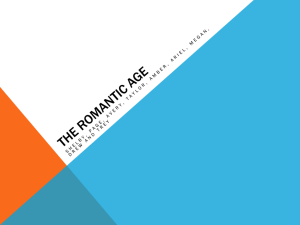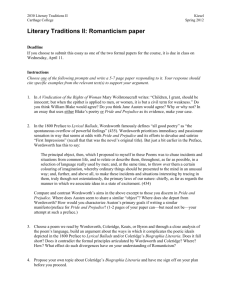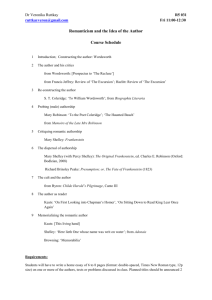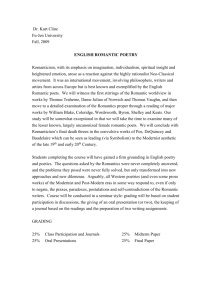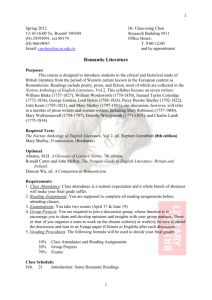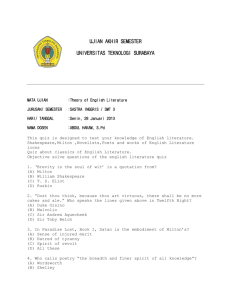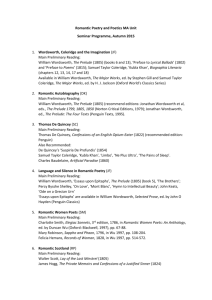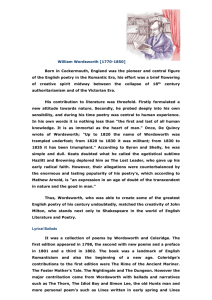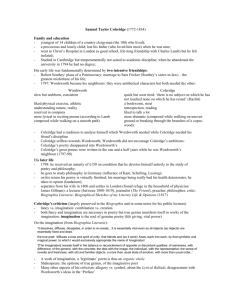THE LITERATURE OF BRITISH ROMANTICISM
advertisement
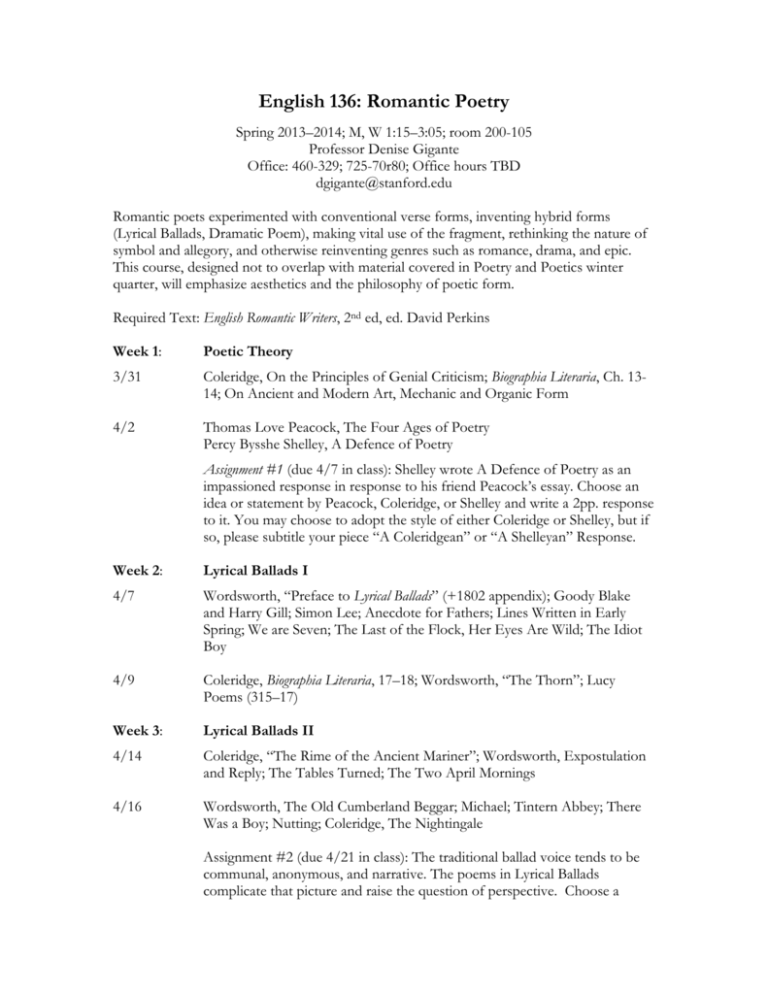
English 136: Romantic Poetry Spring 2013–2014; M, W 1:15–3:05; room 200-105 Professor Denise Gigante Office: 460-329; 725-70r80; Office hours TBD dgigante@stanford.edu Romantic poets experimented with conventional verse forms, inventing hybrid forms (Lyrical Ballads, Dramatic Poem), making vital use of the fragment, rethinking the nature of symbol and allegory, and otherwise reinventing genres such as romance, drama, and epic. This course, designed not to overlap with material covered in Poetry and Poetics winter quarter, will emphasize aesthetics and the philosophy of poetic form. Required Text: English Romantic Writers, 2nd ed, ed. David Perkins Week 1: Poetic Theory 3/31 Coleridge, On the Principles of Genial Criticism; Biographia Literaria, Ch. 1314; On Ancient and Modern Art, Mechanic and Organic Form 4/2 Thomas Love Peacock, The Four Ages of Poetry Percy Bysshe Shelley, A Defence of Poetry Assignment #1 (due 4/7 in class): Shelley wrote A Defence of Poetry as an impassioned response in response to his friend Peacock’s essay. Choose an idea or statement by Peacock, Coleridge, or Shelley and write a 2pp. response to it. You may choose to adopt the style of either Coleridge or Shelley, but if so, please subtitle your piece “A Coleridgean” or “A Shelleyan” Response. Week 2: Lyrical Ballads I 4/7 Wordsworth, “Preface to Lyrical Ballads” (+1802 appendix); Goody Blake and Harry Gill; Simon Lee; Anecdote for Fathers; Lines Written in Early Spring; We are Seven; The Last of the Flock, Her Eyes Are Wild; The Idiot Boy 4/9 Coleridge, Biographia Literaria, 17–18; Wordsworth, “The Thorn”; Lucy Poems (315–17) Week 3: Lyrical Ballads II 4/14 Coleridge, “The Rime of the Ancient Mariner”; Wordsworth, Expostulation and Reply; The Tables Turned; The Two April Mornings 4/16 Wordsworth, The Old Cumberland Beggar; Michael; Tintern Abbey; There Was a Boy; Nutting; Coleridge, The Nightingale Assignment #2 (due 4/21 in class): The traditional ballad voice tends to be communal, anonymous, and narrative. The poems in Lyrical Ballads complicate that picture and raise the question of perspective. Choose a poem and, in 3-4pp., discuss where and how perspective presents an interesting problem. Week 4: Fragment I 4/21 Coleridge, Christabel; Kubla Khan 4/23 Keats, On Seeing the Elgin Marbles; Hyperion, Books 1-3; Week 5: Fragment II 4/28 Keats, The Fall of Hyperion; Lamia 4/30 Shelley, Ozymandias; The Triumph of Life Assignment #3 (due 5/5 in class): Fragments—whether giant relics of the past that stand as a theme in poetry, or poems that are actually broken off— present objects of fascination to Romantic poets. Choose a particular fragment and, in 3-4pp., discuss how it self-consciously works to rupture one totality and/or produce another. Please keep your focus quite tight. Week 6: Symbol and Allegory 5/5 Coleridge, Symbol & Allegory (618); Wordsworth, Resolution and Independence (335) [review, in this context, Wordsworth, The Old Cumberland Beggar; The Thorn; Nutting; Lucy Poems; Coleridge, Christabel] 5/7 Blake, The Mental Traveller; The Crystal Cabinet; The Book of Thel; Visions of the Daughters of Albion (please read illustrated editions of Thel and Visions at www.blakearchive.org) Assignment #4 (due 5/12 in class): Choose a figure (e.g. Geraldine in Coleridge’s “Christabel,” Wordsworth’s Thorn, Blake’s Clod of Clay) or a scene that presents itself as allegory (e.g., in Blake’s “Mental Traveler,” Wordsworth’s “Nutting”) and discuss in 2pp. how the sophisticated manner in which the poet is using the technique of symbol or allegory. Week 7: Romance 5/12 Shelley, Alastor; or the Spirit of Solitude (+ Preface) 5/14 Keats, Eve of St. Agnes; Byron, from Childe Harold’s Pilgrimage Week 10: Drama 5/19 Coleridge, Stage Illusion (614); Byron, Manfred 5/21 Shelley, Prometheus Unbound Paper Assignment #3 (due 5/12 in class): Week 8: Epic I 5/26 Memorial Day: No Class 5/28 Byron, Don Juan (Books I, II) Week 9: Epic II 6/2 Wordsworth, Prelude, Books 1-5 (371–396) 6/4 Wordsworth, Prelude, Books 6-14 (396–422) Assignment #5 (due 6/11 by noon): Please discuss, in 7–8pp., how a single Romantic poet approaches an age-old genre such as Romance, Drama, or Epic, and makes it new. Please keep your argument focused by choosing a single feature of “newness” in one of the longer poems from Weeks 7–9, or a character who stands out as surprising or unusual in his/her role as an epic hero, for example, or a tragic hero, a romance quest-hero, a dramatic antagonist, or damsel in distress. Course Requirements: 1) Attendance at all class sessions, and active participation. No unexcused absences. 2) Four brief writing assignments: 2 of 2pp (Weeks 1 &6); 2 of 3-4pp. (Weeks 3 &5) 3) One 7–8 pp. paper, due 6/11 at noon. Please refer to three critical sources for this paper. You may search academic journals (e.g. Studies in Romanticism, Studies in English Literature, Essays in Criticism, English Literary History, Romanticism, European Romantic Review, Romanticism and Victorianism on the Net, &c.) or consult the Romanticism bibliography provided by Broadview Press : (http://sites.broadviewpress.com/babl/files/2012/01/BiblioVolume4Web.pdf) or the Select Bibliography provided by Professor Nicholas Halmi of Oxford (http://users.ox.ac.uk/~engf0119/biblio.html). The Stanford Library also provides other search tools, including the online catalogue.

